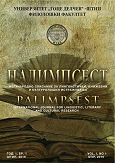VALUES AND SKILLS GAINED BY STUDENTS IN TEACHING FOLK LITERATURE
DOI:
https://doi.org/10.46763/PALIM24917213aAbstract
Globalization puts national ideology and national reality, national identity and national development, the basic sources of statism and other important issues in danger. In the era of globalization, national ideology is going through an extremely complex process. In this context, it is important to protect national and moral values and protect national identity and national differences in the face of globalization. The "National Profile" we have developed aims to foster a strong cultural and moral environment both in the education system and for children and young people, thus increasing the resistance of this environment to external factors. Emphasizing national values is significant for middle and high school students, enabling them to critically assess the national and cultural values of other nations accurately. The education system of the Republic of Azerbaijan attaches great importance to school education (primary school, secondary school, high school). Literature courses are taught in 4443 schools at the secondary and high school levels. The course content consists of distinguished examples from Azerbaijani and world literature. At a time when global calls and threats show how important it is to protect our national identity, we emphasized the teaching of oral folk literature examples, which constitute the content of the literature course, with new methods. As a result, we expressed the necessity of a comprehensive, targeted and systematic arrangement of national, cultural and human values in the Literature course with new content, a new structure and a new perspective, and the implementation of this new method in the school was approved. Particularly in the preface, the importance of using correct tenses in terms of grammar should be emphasized.
Keywords: folk literature; secondary school; high school; students; national and cultural values; globalization; “National Profile”.
Downloads
Downloads
Published
Issue
Section
License
The intellectual property and copyright on the original content of all scientific contributions in the published paper shall remain with the authors. Authors give permission to the PALIMPSEST owner to publish the paper. All authors agree to publish the paper under Attribution-NonCommercial-NoDerivatives 4.0 International license (CC BY-NC-ND 4.0)


